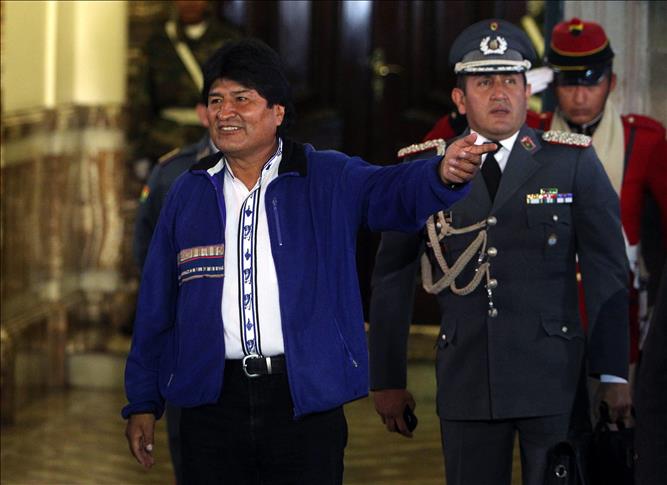
LA PAZ, Bolivia
President Evo Morales is set to cruise to a third consecutive term in Sunday’s presidential election, securing five more years to expand popular social programs.
A rash of polls on the eve of th election put the leftist leader of the Movement for Socialism (MAS) party at 59 percent – a 40-point advantage over his nearest contender, Samuel Doria.
Outright victory will extend Morales’ rule to 2019, making him Bolivia’s longest-serving president in history.
But opponents accuse Morales of defying the Constitution, which bans anyone running for a third term, after a constitutional court ruled in his favor last year.
“There’s no doubt in anyone’s mind who’s going to win,” said Miguel Centellas, a professor of political science at Jackson State University in the U.S. state of Mississippi, who focuses on Bolivia. “The real question is can he get a two-thirds super majority in the legislature.”
Eighty-seven of Bolivia’s 130 lower house seats could allow Morales to do away with term limits, giving way to indefinite election.
The fragmented four-party opposition has struggled to make inroads with the electorate, splitting the vote to Morales’ advantage.
His nearest rival, Doria, a center-right businessman who brought Burger King to Bolivia; or former President Jorge “Tuto” Quiroga, are widely viewed as not having offered clear alternatives.
“The opposition on the right of Morales is so weak, and it’s not that anybody is doing it to them,” said Kathryn Ledebur, of the Cochabamba-based Andean Information network. “They haven’t developed the skills, diplomacy or policy generation to convince anyone in the voting public. They’re regurgitated, remodelled politicians.”
The 54-year-old Morales, a former coca-leaf grower turned country’s first indigenous leader, has presided over a natural gas boom that tripled the economy and slashed poverty by 25 percent.
Known popularly as “Evo,” the Aymara Indian has allied himself with other leftists leaders such as Venezuela’s late Hugo Chavez and Ecuador’s Rafael Correa, united in their contempt for the United States and the neoliberal “Washington consensus.”
Morales has come under fire for hostility to the opposition and smothering of the press. His party boycotted a presidential debate last month, saying it refused to debate with “neoliberals” opponents.
Sunday, Bolivia’s 6-million electorate will choose 130 deputies and 36 senators by a mixture of first-past-the-post and proportional representation.
Voting is compulsory for those between 18 and 70 years of age.
To ensure high turnout, election law bans alcohol 72 hours before polling, and all transport on Election Day. An act of “electoral silence” began Thursday, which prevents any further campaigning by candidates.
To win, a candidate must secure an absolute majority of the vote or at least 40 percent with a 10 percent margin over the second candidate.
Election observers from the Organization of American States (OAS) have dismissed accusations of voter fraud after 20,000 deceased persons remained on the electoral register.
OAS president Alvaro Colom said it was “normal” for an election, pointing out Bolivia’s biometric registry used to prevent double-voting.
Morales won 54 percent of the vote in 2005, and increased his share of the polling to 64 percent in 2009.
Anadolu Agency website contains only a portion of the news stories offered to subscribers in the AA News Broadcasting System (HAS), and in summarized form. Please contact us for subscription options.

